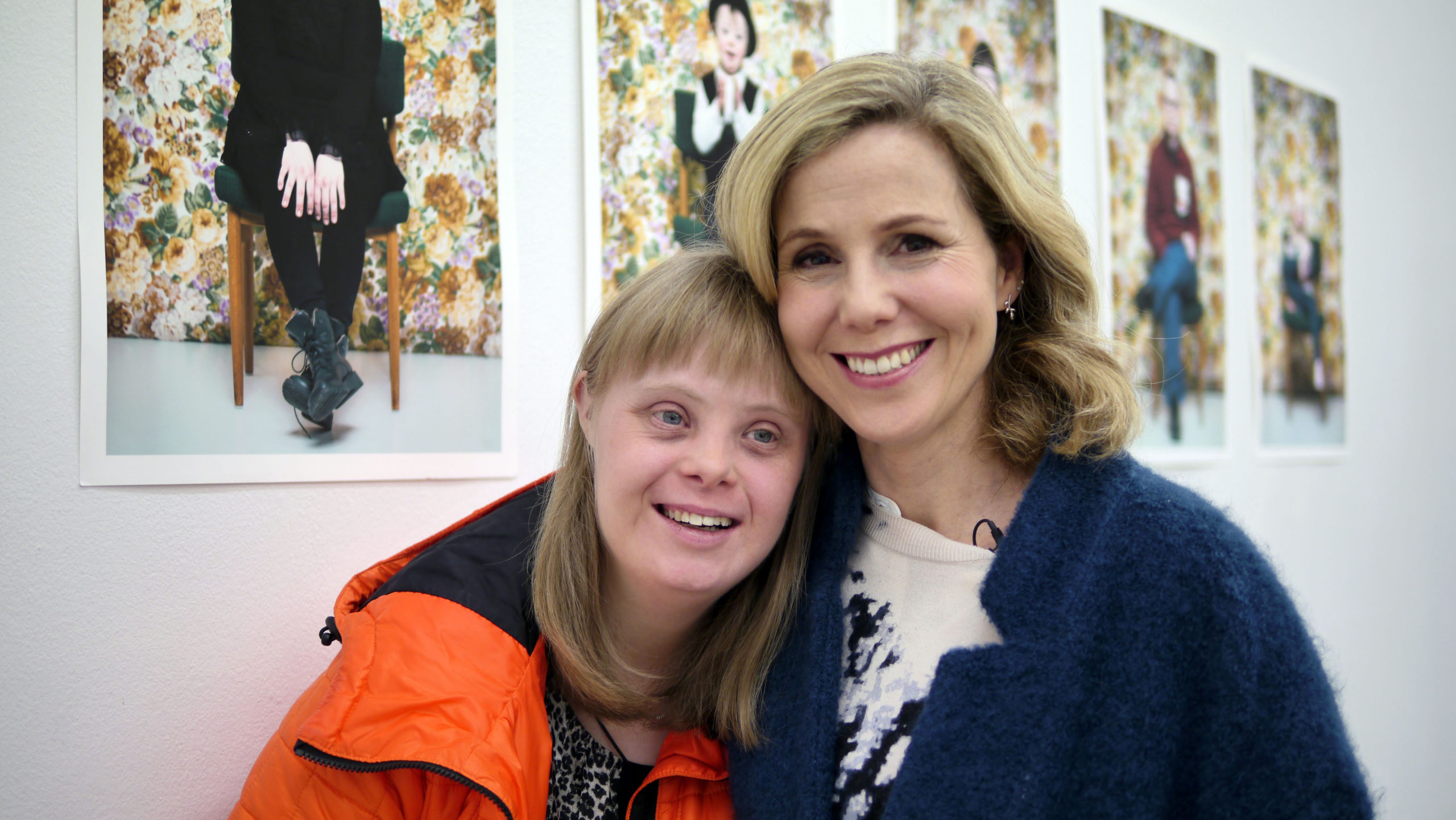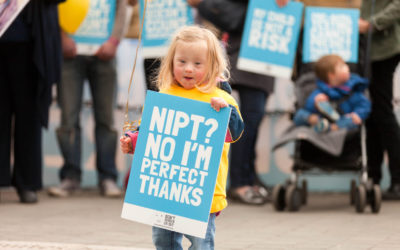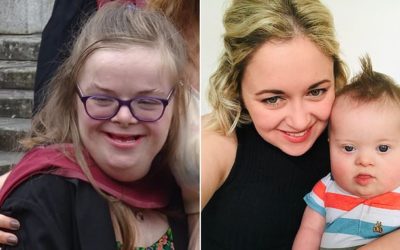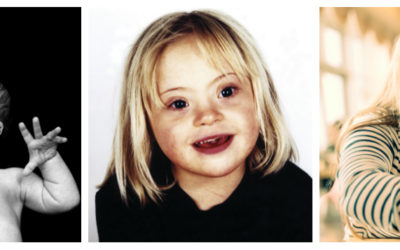“If we deny someone the chance to be born because we’ve decided they won’t meet a predetermined measure of status or achievement, then we fail to grasp what it is to be human”
“I’m going to do a blood test to see whether your son has Down syndrome. I’m so sorry.” You never forget the moment of diagnosis. The doctor looked like Iain Glen. I didn’t cry, though the nurse on duty did. I hyperventilated and flapped my arms. I remember thinking, “If I ever have to act shock in a film, I shouldn’t do this, it’s too much.” We drank sugary tea and were taken into a side room, where we phoned friends in low voices.
One doctor said, “Some of them live quite a long time” and another, “The adults can have beautiful speckledy eyes.” Heart problems and leukaemia were mentioned, sense of humour and dance ability were not. If anyone at the Royal Free Hospital in north London knew that most people with Down syndrome go to mainstream school, have above-average emotional intelligence, are loved by their families and are happy, they certainly weren’t letting on.
It had taken ten days for anyone to notice Olly’s extra chromosomes. My mother kept saying, “The baby’s not gripping”, because she’d read somewhere that newborns have a monkey-strength grasp reflex and can support their own weight if dangled from a pole. But the birth had gone surreal, as they often do, and no one was listening. Someone had taken blood from a vein downstream of my drip so the doctors were more intrigued by me being nine-tenths saline solution than by a baby with a weak handshake.
On day two I asked the paediatrician why Olly’s eyes weren’t opening properly. Were his cheeks too big, I asked. Was it because I’d eaten too many éclairs when I was pregnant? “Possibly, yes,” she said. How we laughed.
On day three the midwife looked at my notes. “You were born in Hong Kong. Are there Chinese relatives?” No one had ever said anything more amusing. But perhaps it’s not surprising medics can’t always pick out a baby with Down syndrome in a line-up. There are only around 40,000 people with the condition in the UK. I suppose most doctors have never met anyone with Down syndrome, never been friends with someone with Down syndrome, never kept their toothbrush in the same cup. Certainly the description of someone with Down syndrome in a medical textbook and the 12-year-old who shares my home are worlds apart.
Olly wasn’t two before I’d begun to feel like a fraud. I was still getting lots of head tilts and sympathy, but my life hadn’t been ruined at all. Far from it. It was different, that’s all. More challenges, but a lot more laughter, too. They say comedy is tragedy played at 120 miles per hour. Maybe that’s what’s happening.
Where I live I don’t get recognised much as the “Bear with” woman from Miranda. I’m Olly’s mum. Olly gets about a bit, you see. People with Down syndrome can’t climb, says the book. He didn’t get that memo. He scaled a 12ft fence over and over again to get into our neighbours’ garden because he wanted to play with their twins. We’re all friends now: we put ladders up.
He makes an impression. When he was seven we went to Disney World. We checked into the Pixar hotel. While I had a bath, my husband [Andrew Bermejo], son Luke, then five, and Tom, a baby, fell asleep. Olly went off to find Nemo. The exchange with security five minutes later went something like this.
“My son’s run away!”
Security (into walkie talkie): “We have a missing child. Ma’am, what was he wearing?”
“Nothing.”
Briefest of pauses. “We got him, ma’am.”
“Did you know he had Down syndrome when you were pregnant?” It’s not a nice question, but people ask anyway. Sometimes they say, “Didn’t you know?”, which is worse. I didn’t know he’d tell bad jokes and love hip-hop and support seven Premier League football clubs at once either. Of course I’d have kept him. I like a challenge and it’s not as if I was living a conventional life that an unconventional child would disrupt. But I’m an aberration. In the UK 90 per cent of women who receive a diagnosis of Down syndrome in pregnancy terminate. The question, given how little anyone seems to know about the realities of living with Down syndrome, is why? What information do people have when they make these difficult decisions, and would they choose differently if they knew the truth?
I started making my BBC2 documentary because I don’t feel that Down syndrome is a disability so severe that it warrants such huge government investment in so many state-of-the-art tests. Some advocacy groups believed it was a government objective to reduce the Down syndrome population to save money. I really hoped they were wrong. Here we screen to give women choice.
However, while making the documentary I heard many, many stories of women being pressurised by medical professionals to screen, and even to terminate. “Let’s stop this nonsense now while you still can”, “I’ve booked you in for a termination in the morning”, “Your marriage will break up if you have this baby”, “You don’t want another one like her, do you”, “They put a great strain on the NHS, you know”. These are all direct quotes. I hated being pregnant. I find the idea of being forced to carry an unwanted baby to term pretty horrifying, but I think being pressured to terminate a wanted baby is much worse. Choice works both ways, after all.
In the UK we will soon make freely available on the NHS the most accurate tests in the world, combined with the longest possible termination window. A foetus with a disability can be terminated right up until the moment when labour starts. Excluding the Netherlands, where babies with a disability can be terminated after birth too, under the Groningen Protocol. I’ve never studied ethics so I don’t understand how that can be acceptable, but I do know that it hurts my heart.
I don’t think we’ve got to this rather ugly point because “the baddies” have been in charge. The science of prenatal screening is just developing way faster than the ethics around it. Soon we will be able to screen prenatally for so much more – schizophrenia, Alzheimer’s, hair colour, academic ability. It’s time we started to think harder about these things. Who do we want in society, who gets to choose and what on earth is “normal” anyway?
Perhaps, in our increasingly visual, media-led culture we’ve confused youth, beauty and status with perfection. But deep down we all know that the things we really care about aren’t visible at all – love, compassion, humour, empathy, playfulness, creativity. These are the deepest things that make us human, and they all exist as much, if not more, in “imperfect” bodies. They have nothing to do with being on the cover of Vogue or productivity or money, they’re just about being human. This is the truth that Miranda and Bridget Jones and characters like them describe so well. It’s our weaknesses and differences that make us who we are.
If we deny someone the chance to be born because we’ve already decided they won’t meet some predetermined measure of status or achievement, then we’ve seriously failed to grasp what it is to be human. Maybe one of the great gifts people with disabilities have for the rest of us is the power to remind us of this, to teach us, and to lead us back into our own humanity. When I was younger, if you’d asked me the meaning of life, I’d have tried to give you some clever answer. But now I’d say love. It doesn’t matter if you can do your times tables or not if you have love. I used to value independence. I now wonder if independence isn’t a little lonely and if interdependence isn’t where it’s really at.
Sometimes I’m ashamed I can’t manage my kids without my parents, but other times I’m just glad we’re so much closer. I was at work and Olly walked to his girlfriend’s house and sat down in her garden and refused to leave. I ring my dad in a panic again. And Dad drops everything and drives round, winds down the window. “Hey Olly, I’ve come to take you for an ice cream.”
Problem solved. My dad and I have laughed a lot. Eaten a lot of ice cream. Journalists ask me, “But Olly’s doing well, how would you feel if he wasn’t so happy, confident or smart?” I think it would be a shame if any parent’s love for their child, whatever their condition or health, depended on whether or not that child was always happy, confident or smart. In fact, if you think about it, it’s often just when a child isn’t happy or confident that a parent suddenly knows how deeply they love them and how they need to express that love.
Most of the time Olly’s Down syndrome is more of a comedy than a tragedy. The kind of comedy where paint gets thrown and the police occasionally get called. He keeps me grounded. It’s hard to get too serious about life when you’re chasing a child in a Leo Sayer wig down the street in your pyjamas.
People say, “But we can’t know how the child is going to turn out.” Well, that’s true of any child. All we can know for sure about a baby born with Down syndrome today is that this generation will definitely exceed the expectations of the last.
I was told Olly might not walk. He walks, runs, swims and rides a bike. I was told he might not talk. He recites poetry, he acts, he plays the piano. I was told he wouldn’t be able to handle money or get about independently. By 8am today Olly had made his own breakfast, got the telly working that no one else could fix and turned on Match of the Day, popped out to buy a jumbo pack of marshmallows, eaten the lot and called me a “wazzock”.
Yes there are struggles, but to go all L’Oréal on you – he’s worth it.
A World without Down’s Syndrome? is on BBC2 at 9pm tonight



